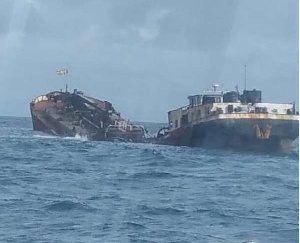 The oil tanker vessel carrying 1,200 tonnes of light crude oil split into two on May 24, 2018
The oil tanker vessel carrying 1,200 tonnes of light crude oil split into two on May 24, 2018
A group is calling for an immediate environmental impact assessment at the Tema Port where an oil tanker vessel carrying 1,200 tonnes of light crude oil split into two halves on May 24, 2018.
The Bahamas registered oil tanker which had been at the Tema Port anchorage since May 12, 2018, mysteriously split into two within hours.
“Within hours, the ship split into two. The stern of the oil vessel drifted away from the bowl. But we were able to pull the stern out of the danger area where it won’t disturb other vessels”, Lieutenant Colonel Joseph Punamane, Tema Port Security Manager, told the GNA
He explained that while authorities had managed to prevent a spillage of the oil, they were doing their best to get the sunken part to float, adding that the fuel in the other part was also carefully being transferred to fuel tankers with the help of cannons.
But the Abibiman Foundation believes otherwise, and has underscored the need for an independent committee to be set up to investigate and assess the impact of “the oil spillage”.
In a statement on June 4, the group said the impact of this spillage must be monitored to ensure that both the environment and livelihoods of fishermen and other local dependents within the catchment area, are adequately compensated and protected.
It called for immediate “clean up and restoration of the damaged environment in the affected areas,” noting it plays a critical role in the livelihoods of residents within the Tema metropolis and the country at large
It expressed worry about what is said is the current lack of capacity in oil spillage response in the country and the failure to ensure compliance and enforcement of quality standards to prevent avoidable accidents from occurring.
“These failings, once again, has culminated into huge environmental destruction of coastal and inland biodiversity which rural community livelihoods depend on,” the statement said.
Abibiman Foundation has thus called for stakeholders to create a new independent mechanism that would conform to international best practice to prevent, identify, and respond to such oil spills in Ghana and clean up contaminated sites.
“Government must put all necessary measures in place to avoid reoccurrences of similar oil spillage in the future,” it advised.